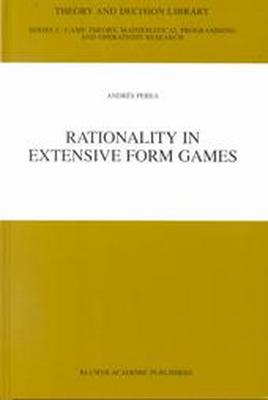Book on Rationality in Extensive Form Games
General information
Between 1998 and 2001 I have been writing my book Rationality in Extensive Form Games. The book has appeared in 2001, and has been published by Kluwer Academic Publishers (Boston/Dordrecht/London). It is part of the Theory and Decision Library, Series C: Game Theory, Mathematical Programming and Operations Research.
If you want to have a look inside my book, or are interested in buying it, click here.
Geir Asheim has written a review on this book, which has appeared in the Journal of Economics.
Summary
In this book, I discuss various concepts of rationality in dynamic games. Examples of such concepts are: backward induction, subgame perfect equilibrium, quasi-perfect equilibrium, sequential equilibrium, various notions of forward induction, stable sets of equilibria, weak sequential rationalizability, and extensive form rationalizability. For each of these concepts, I discuss its motivation, often by means of examples, provide a precise definition, investigate its properties, and analyze its relationship with other rationality concepts. For almost all results I provide a complete proof.
This book has been written for PhD-students and researchers who want to learn about the problem of rational behavior in dynamic games. Researchers within the area may also use the book to deepen their knowledge about some parts of the field. Parts of this book can be used for a PhD-course in game theory.
Contents
Chapter 1. Introduction
Chapter 2. Extensive Form Games
2.1. Extensive form structures and strategies 2.2. Decision theoretic framework 2.3. Conjectures about opponents’ behavior 2.4. Local conjectures 2.5. Revision of conjectures 2.6. Best responses to conjectures
Chapter 3. Backward Induction and Nash Equilibrium
3.1. Backward induction 3.2. Nash equilibrium 3.2.1 Games with perfect information 3.2.2. Zero-sum games 3.2.3. Zermelo’s theorem 3.3. Subgame perfect equilibrium 3.4. Perfect equilibrium 3.5. Quasi-perfect equilibrium 3.6. Proper equilibrium
Chapter 4. Consistency and Sequential Rationality
4.1. Consistency of assessments 4.2. Sequential rationality 4.3. One-deviation property 4.4. Weak sequential rationality
Chapter 5. Forward Induction
5.1. Examples 5.2. Iterated weak dominance 5.3. Stable sets of equilibria 5.3.1. Motivation 5.3.2. Definition and properties 5.4. Forward induction equilibrium 5.5. Justifiable sequential equilibrium 5.6. Stable sets of beliefs
Chapter 6. Transformations of Games
6.1. Thompson-Elmes-Reny transformations 6.1.1. Transformations 6.1.2. Games in reduced form 6.1.3. Pure reduced normal form 6.2. Thompson-Elmes-Reny invariance 6.3. Proper equilibrium 6.4. Normal form information sets 6.5. Normal form sequential equilibrium 6.6. Kohlberg-Mertens transformations 6.6.1. Superfluous chance moves 6.6.2. Mixed reduced normal form 6.6.3. Kohlberg-Mertens invariance 6.7. Player splittings
Chapter 7. Rationalizability
7.1. Static belief hierarchies 7.2. Rationalizability 7.2.1. Correlated rationalizability 7.2.2. Uncorrelated rationalizability 7.3. Permissibility 7.4. Conditional belief hierarchies 7.5. Weak sequential rationalizability 7.6. Extensive form rationalizability.
